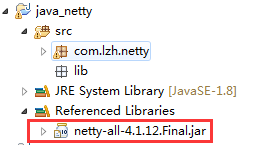第一步:设置开发环境
• 安装JDK,下载地址http://www.oracle.com/technetwork/java/javase/archive-139210.html
• 下载netty包,下载地址http://netty.io/
• 安装Eclipse
导入包

第二步:编写一个应答服务器
通过创建ServerBootstrap对象来启动服务器,然后配置这个对象的相关选项,如端口、线程模式、事件循环,并且添加逻辑处理程序用来处理业务逻辑(下面是个简单的应答服务器例子)
package com.lzh.netty; import io.netty.bootstrap.ServerBootstrap; import io.netty.channel.ChannelFuture; import io.netty.channel.ChannelInitializer; import io.netty.channel.ChannelOption; import io.netty.channel.EventLoopGroup; import io.netty.channel.nio.NioEventLoopGroup; import io.netty.channel.socket.SocketChannel; import io.netty.channel.socket.nio.NioServerSocketChannel; /** * 通过创建ServerBootstrap对象来启动服务器,然后配置这个对象的相关选项,如端口、线程模式、事件循环,并且添加逻辑处理程序用来处理业务逻辑 */ public class NettyServer { private final int port; public NettyServer(int port){ this.port=port; } public void start() throws Exception{ //1.第一个线程组是用于接收Client端连接的 EventLoopGroup bossGroup = new NioEventLoopGroup(); //2.第二个线程组是用于实际的业务处理的 EventLoopGroup workerGroup = new NioEventLoopGroup(); try{ //创建ServerBootstrap实例来引导绑定和启动服务器 ServerBootstrap b=new ServerBootstrap(); //1.设置InetSocketAddress让服务器监听某个端口已等待客户端连接。 //2.指定NIO的模式,如果是客户端就是NioSocketChannel //3.调用childHandler方法传ChannelInitializer类型的参数,ChannelInitializer是个抽象类,所以需要实现initChannel方法,这个方法就是用来设置ChannelHandler b.group(bossGroup,workerGroup).channel(NioServerSocketChannel.class) .option(ChannelOption.SO_BACKLOG, 1024)//连接数 .option(ChannelOption.SO_SNDBUF, 32*1024)//设置发送缓冲区 .option(ChannelOption.SO_RCVBUF, 32*1024)//设置接收缓冲区 .option(ChannelOption.SO_KEEPALIVE, true)//长连续 .childHandler(new ChannelInitializer<SocketChannel>() { protected void initChannel(SocketChannel cn) throws Exception { cn.pipeline().addLast(new NettyServerHandler()); } }); //绑定服务器等待直到绑定完成,调用sync()方法会阻塞直到服务器完成绑定,然后服务器等待通道关闭,因为使用sync(),所以关闭操作也会被阻塞 ChannelFuture f=b.bind(port).sync(); if (f.isSuccess()) { System.out.println("启动Netty服务成功,端口号:" + this.port); } //这里会一直等待,直到socket被关闭 f.channel().closeFuture().sync(); }finally{ //关闭EventLoopGroup和释放所有资源,包括创建的线程 bossGroup.shutdownGracefully(); workerGroup.shutdownGracefully(); } } public static void main(String[] args) throws Exception{ new NettyServer(8000).start(); } }
实现服务器业务逻辑
package com.lzh.netty; import io.netty.buffer.ByteBuf; import io.netty.buffer.Unpooled; import io.netty.channel.ChannelHandlerContext; import io.netty.channel.ChannelInboundHandlerAdapter; public class NettyServerHandler extends ChannelInboundHandlerAdapter{ //重写channelRead方法,这个方法在任何时候都会被调用来接收数据 @Override public void channelRead(ChannelHandlerContext ctx, Object msg) throws Exception { ByteBuf buf=(ByteBuf)msg; byte [] bt=new byte[buf.readableBytes()]; buf.readBytes(bt); System.out.println("Server received: " + new String(bt,"utf-8")); //服务器返回客户端信息 String str="Hi client !!!"; ctx.writeAndFlush(Unpooled.copiedBuffer(str.getBytes())); } //重写ChannelHandler的exceptionCaught方法可以捕获服务器的异常, //比如客户端连接服务器后强制关闭,服务器会抛出"客户端主机强制关闭错误",通过重写exceptionCaught方法就可以处理异常 @Override public void exceptionCaught(ChannelHandlerContext ctx, Throwable cause) throws Exception { cause.printStackTrace(); ctx.close(); } }
说明:
1.Netty使用多个Channel Handler来达到对事件处理的分离,因为可以很容的添加、更新、删除业务逻辑处理handler。Handler很简单,它的每个方法都可以被重写,它的所有的方法中只有channelRead方法是必须要重写的。
2.重写ChannelHandler的exceptionCaught方法可以捕获服务器的异常,比如客户端连接服务器后强制关闭,服务器会抛出"客户端主机强制关闭错误",通过重写exceptionCaught方法就可以处理异常,比如发生异常后关闭ChannelHandlerContext。
第三步:编写应答程序的客户端
package com.lzh.netty; import io.netty.bootstrap.Bootstrap; import io.netty.buffer.Unpooled; import io.netty.channel.ChannelFuture; import io.netty.channel.ChannelInitializer; import io.netty.channel.EventLoopGroup; import io.netty.channel.nio.NioEventLoopGroup; import io.netty.channel.socket.SocketChannel; import io.netty.channel.socket.nio.NioSocketChannel; public class NettyClient { private final String host; private final int port; public NettyClient(String host,int port){ this.host=host; this.port=port; } public void start() throws Exception{ //创建EventLoopGroup对象并设置到Bootstrap中,EventLoopGroup可以理解为是一个线程池,这个线程池用来处理连接、接受数据、发送数据 EventLoopGroup group =new NioEventLoopGroup(); try{ //创建Bootstrap对象用来引导启动客户端 Bootstrap b=new Bootstrap(); // 1.创建InetSocketAddress并设置到Bootstrap中,InetSocketAddress是指定连接的服务器地址 // 2.添加一个ChannelHandler,客户端成功连接服务器后就会被执行 b.group(group).channel(NioSocketChannel.class) //.remoteAddress(new InetSocketAddress(host,port)) .handler(new ChannelInitializer<SocketChannel>() { @Override protected void initChannel(SocketChannel ch) throws Exception { //添加一个“入站”handler到ChannelPipeline ch.pipeline().addLast(new NettyClientHandler()); } }); //调用Bootstrap.connect()来连接服务器 ChannelFuture f=b.connect(host, port).sync(); f.channel().writeAndFlush(Unpooled.copiedBuffer("hello netty".getBytes())); Thread.sleep(1000); f.channel().writeAndFlush(Unpooled.copiedBuffer("hello netty1".getBytes())); Thread.sleep(1000); f.channel().writeAndFlush(Unpooled.copiedBuffer("hello netty2".getBytes())); f.channel().closeFuture().sync(); }finally{ //关闭EventLoopGroup来释放资源 group.shutdownGracefully().sync(); } } public static void main(String[] args) throws Exception{ new NettyClient("127.0.0.1", 8000).start(); } }
实现客户端的业务逻辑
package com.lzh.netty; import io.netty.buffer.ByteBuf; import io.netty.buffer.ByteBufUtil; import io.netty.channel.ChannelHandlerContext; import io.netty.channel.SimpleChannelInboundHandler; public class NettyClientHandler extends SimpleChannelInboundHandler<ByteBuf>{ @Override protected void channelRead0(ChannelHandlerContext ctx, ByteBuf msg)throws Exception { ByteBuf buf=(ByteBuf)msg; byte [] bt=new byte[buf.readableBytes()]; buf.readBytes(bt); System.out.println("Client received: " + new String(bt,"utf-8")); System.out.println("Client received: " + ByteBufUtil.hexDump(msg.readBytes(msg.readableBytes()))); } //重写ChannelHandler的exceptionCaught方法可以捕获服务器的异常, //比如客户端连接服务器后强制关闭,服务器会抛出"客户端主机强制关闭错误",通过重写exceptionCaught方法就可以处理异常 @Override public void exceptionCaught(ChannelHandlerContext ctx, Throwable cause) throws Exception { cause.printStackTrace(); ctx.close(); } /** * 1.为什么在这里使用的是SimpleChannelInboundHandler而不使用ChannelInboundHandlerAdapter? * 主要原因是ChannelInboundHandlerAdapter在处理完消息后需要负责释放资源。在这里将调用ByteBuf.release()来释放资源。 * SimpleChannelInboundHandler会在完成channelRead0后释放消息,这是通过Netty处理所有消息的ChannelHandler实现了ReferenceCounted接口达到的。 * 2.为什么在服务器中不使用SimpleChannelInboundHandler呢?因为服务器要返回相同的消息给客户端,在服务器执行完成写操作之前不能释放调用读取到的消息,因为写操作是异步的,一旦写操作完成后,Netty中会自动释放消息。 */ }
第四步:编译和运行服务器和客户端
服务端启动

客户端启动
: 
